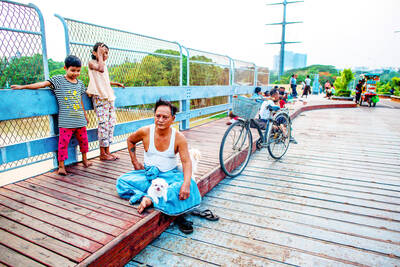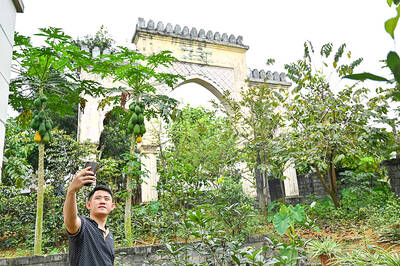Turkey’s highest court on Wednesday upheld a controversial media law that mandates prison terms for people judged to be spreading “disinformation,” rejecting the main opposition party’s request for its annulment.
The legislation calls for up to three years in prison for journalists or social media users convicted of spreading information considered to be “contrary to the truth” concerning domestic and international security, public order or health.
It was approved in parliament a year ago with the votes of legislators from Turkish President Recep Tayyip Erdogan’s ruling party and its nationalist allies, heightening concerns over media freedoms and free speech in the country.

Photo: AFP
The main opposition party had petitioned the Turkish Constitutional Court seeking its annulment, arguing that the law would be used to further silence government critics by cracking down on social media and independent reporting.
The court’s justices, however, rejected the request by a majority vote during a meeting on Wednesday, the Turkish state-run Anadolu Agency reported.
It did not elaborate on the ruling.
About 30 people have been prosecuted under the law since it took effect last year, the Cumhuriyet newspaper reported.
Last week, authorities arrested investigative journalist Tolga Sardan under the law, accusing him of engaging in disinformation over his report about allegations of corruption within the judiciary.
The journalist, who works for online news Web site T24, was released days later pending the outcome of a trial, on condition that he reports regularly to authorities. He was also barred from traveling abroad.
Erdogan had long argued for a law to combat disinformation and fake news, saying false news and rising “digital fascism” pose national and global security threats.
Freedom of expression and media freedoms have declined dramatically in Turkey over the years. Reporters Without Borders ranks Turkey 165 out of 180 countries in press freedoms. Currently, 19 journalists or media sector workers are behind bars in the country, the Journalists’ Union of Turkey said.

As the sun sets on another scorching Yangon day, the hot and bothered descend on the Myanmar city’s parks, the coolest place to spend an evening during yet another power blackout. A wave of exceptionally hot weather has blasted Southeast Asia this week, sending the mercury to 45°C and prompting thousands of schools to suspend in-person classes. Even before the chaos and conflict unleashed by the military’s 2021 coup, Myanmar’s creaky and outdated electricity grid struggled to keep fans whirling and air conditioners humming during the hot season. Now, infrastructure attacks and dwindling offshore gas reserves mean those who cannot afford expensive diesel

Does Argentine President Javier Milei communicate with a ghost dog whose death he refuses to accept? Forced to respond to questions about his mental health, the president’s office has lashed out at “disrespectful” speculation. Twice this week, presidential spokesman Manuel Adorni was asked about Milei’s English Mastiff, Conan, said to have died seven years ago. Milei, 53, had Conan cloned, and today is believed to own four copies he refers to as “four-legged children.” Or is it five? In an interview with CNN this month, Milei referred to his five dogs, whose faces and names he had engraved on the presidential baton. Conan,

French singer Kendji Girac, who was seriously injured by a gunshot this week, wanted to “fake” his suicide to scare his partner who was threatening to leave him, prosecutors said on Thursday. The 27-year-old former winner of France’s version of The Voice was found wounded after police were called to a traveler camp in Biscarrosse on France’s southwestern coast. Girac told first responders he had accidentally shot himself while tinkering with a Colt .45 automatic pistol he had bought at a junk shop, a source said. On Thursday, regional prosecutor Olivier Janson said, citing the singer, that he wanted to “fake” his suicide

Le Tuan Binh keeps his Moroccan soldier father’s tombstone at his village home north of Hanoi, a treasured reminder of a man whose community in Vietnam has been largely forgotten. Mzid Ben Ali, or “Mohammed” as Binh calls him, was one of tens of thousands of North Africans who served in the French army as it battled to maintain its colonial rule of Indochina. He fought for France against the Viet Minh independence movement in the 1950s, before leaving the military — as either a defector or a captive — and making a life for himself in Vietnam. “It’s very emotional for me,”